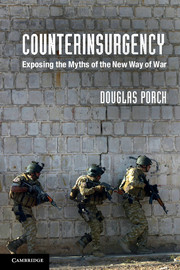Book contents
- Frontmatter
- Contents
- List of illustrations
- List of maps
- Preface and acknowledgments
- 1 A “happy combination of clemency with firmness”: the small wars prologue
- 2 The road from Sedan
- 3 The paroxysms of imperial might in the shadow of the Great War
- 4 From Tipperary to Tel Aviv: British counterinsurgency in the World War II era
- 5 From small wars to la guerre subversive: the radicalization and collapse of French counterinsurgency
- 6 Vietnam, counterinsurgency, and the American way of war
- 7 “A conspiracy of heroes”: revolution and counterinsurgency in Latin America
- 8 Building the “most successful counterinsurgency school”: COIN as the British way of war
- 9 Britain’s Thirty Years’ War in Northern Ireland
- 10 Vietnam with a happy ending: Iraq and “the surge”
- 11 Conclusion
- Notes
- Select bibliography
- Index
3 - The paroxysms of imperial might in the shadow of the Great War
Published online by Cambridge University Press: 05 June 2014
- Frontmatter
- Contents
- List of illustrations
- List of maps
- Preface and acknowledgments
- 1 A “happy combination of clemency with firmness”: the small wars prologue
- 2 The road from Sedan
- 3 The paroxysms of imperial might in the shadow of the Great War
- 4 From Tipperary to Tel Aviv: British counterinsurgency in the World War II era
- 5 From small wars to la guerre subversive: the radicalization and collapse of French counterinsurgency
- 6 Vietnam, counterinsurgency, and the American way of war
- 7 “A conspiracy of heroes”: revolution and counterinsurgency in Latin America
- 8 Building the “most successful counterinsurgency school”: COIN as the British way of war
- 9 Britain’s Thirty Years’ War in Northern Ireland
- 10 Vietnam with a happy ending: Iraq and “the surge”
- 11 Conclusion
- Notes
- Select bibliography
- Index
Summary
If the French defeat at Sedan had discredited small wars as an organizing principle for European armies after 1870, the battles of Verdun and the Somme in 1916 challenged the usefulness of conventional war as the continuation of politics by other means, and sent military theorists in search of alternatives to the industrialized attrition of trench combat in the age of total war. A postmodernist malaise emerged at the intersection of Lyautey’s warnings about the bureaucratization of conventional war, which provided few opportunities for individual self-validation through heroic acts, and the irrelevance of such personal qualities as toughness, valor, and discipline in the age of machine warfare. Only fighter aces, U-boat commanders, storm troopers, and small warriors stood out from the unrelieved mechanization of slaughter as much needed heroes who represented soldierly values and as figures to return decision to warfare as master of the machine and not its servant. In these circumstances, the old wine of small war, if not in new bottles then at least with updated labels, reasserted its allure. Paul von Lettow-Vorbeck’s campaign of harassment against the British in East Africa and T. E. Lawrence’s alleged unraveling of the Ottoman Empire with a posse of Bedouin captured the public imagination much in need of reinforcement in the face of strategic ambiguity and growing domestic sacrifice. Theorists as varied as Basil Liddell Hart and Mao Tse-tung proffered insurgency as a strategy to achieve “victory without battle.” In this way, insurgency and counterinsurgency could legitimize themselves as a Sun-Tzuian substitute for the conventional Jominian quest for the “decisive battle.”
- Type
- Chapter
- Information
- CounterinsurgencyExposing the Myths of the New Way of War, pp. 79 - 122Publisher: Cambridge University PressPrint publication year: 2013



